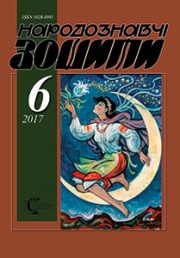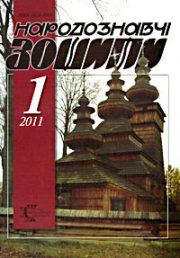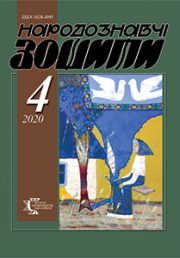The Ethnology Notebooks. 2020. # 6 (156), 1256—1272
УДК 17.035.3(477):(470-045.625)
DOI https://doi.org/10.15407/nz2020.06.1256
Oksana KULISH
- ORCID ID: https://orcid.org/0000-0002-9625-0690
- Candidate of Sciences in Art Studies (Ph. D),
- Lecturer of Cherkasy Professional College of Food Technology and Business,
- 84, Smilyanska st., 18008, Cherkasy, Ukraine,
- e-mail: kulish_oxana_andre@ukr.net
The topicality of the research is formed by the coverage of the ingrained worldview on ostracism and badgering in Ukrainian society. The problem: chaotic perception of the concepts «ostracism, bullying, mobbing» and their determination in the ontological dimension of modern Ukrainian society. The object of research: the phenomena of ostracism and badgering within the Ukrainian society and in relation to Ukraine. The subject of research: Russian assimilation in the ontological dimension of modern Ukrainian society. The purpose:to find out the relationship between the phenomena of ostracism and badgering to Russian assimilation in the ontological dimension of modern Ukrainian society in the areas of ethical constructs of tolerance and intolerance. The methodological basis is a type of research — ethnoethics in the context of social anthropology by descriptive approach, methods of retrospection and synthesis, analysis in the historical dynamics of the 20th — first third of the 21st century the functioning of the phenomena ostracism, bullying-mobbing, the concepts of tolerance, intolerance in Ukrainian society.
As a result, domestic sources of sociology-humanitarian research are analyzed on the selected concepts of «ostracism, bullying, mobbing» for their explication in the stream of social anthropology and the study of their manifestations. In retrospect to the Ukrainian existence of the Soviet times, the functioning of ostracism, bullying, mobbing and Russian assimilation is analyzed. From the standpoint of ethnoethics, the influence of Russian assimilation on the ethical construct of intolerance in the worldview specifics of modern Ukrainian society is clarified as a legacy of the criminal worldview of the Russian-Bolshevist-communistic lumpen. The influence of Russian cultural diffusion through the Kremlin’s social and communication technologies on modern Ukrainian society at the stages of its peaceful and militarized states is considered.
Keywords: ostracism, bullying, mobbing, badgering, tolerance, intolerance, Ukrainian society, Russian assimilation, Russian cultural diffusion.
REFERENCES
- Bekeshkina, I., Pechonchyk, T. (Ed.), & Yavorsky, V. (2017). What Ukrainians know and think about human rights: nationwide study. Retrieved from: http://osvita.khpg.org/files/docs/1504784497.pdf (Last accessed: 11.05.20) [in Ukrainian].
- Alieksieienko, Tetiana. (2019). Phenomena of mobbing and bullying in relations between the individual and the collective. Upravlinnia osvitoiu, 4, 46—53 [in Ukrainian].
- Korabl’ova, Olena.(2010). The impact of mobbing on the formation and socialization of personality. Collection of scientific works of the Khmelnytsky Institute of Social Technologies of the University «Ukraine», 4, 120—124 [in Ukrainian].
- Korabl’ova, O.О.(2011). Causes of mobbing as a socio-pedagogical problem of adolescent schoolchildren. Collection of scientific works of the Khmelnytsky Institute of Social Technologies of the University «Ukraine», 4, 66—69 [in Ukrainian].
- Bojko-Buzyl’, Yu.Yu., & Protsyk, L.S. (2020). Peculiarities of children’s and teacher’s bullying in the school environment. Scientific Bulletin of Kherson State University, 1, 86—94 [in Ukrainian].
- Nazarevych, Viktoriia. (2019). Ostracism as a prerequisite of bullying. The theory and practice of modern psychology, 6, 70—77 [in Ukrainian].
- Nazarevych, Viktoriia. (2020). Functions of ostracism in the education system. Psychology: Reality & Prospects: Collection of scientific works of Rivne State University of Humanities (Issue 14, pp. 177—186) [in Ukrainian].
- Borschevs’ka, A.V. (2014). Bullying in schools as a factor of mental ill health. Scientific Bulletin of the International Humanities University, 6, 48—52 [in Ukrainian].
- Hordiienko, Nataliia. (2018). The problem of bullying among the pupils of boarding schools: sociological aspect. European political and law discourse (Vol. 5, issue 1, pp. 201—209) [in Ukrainian].
- Ozhyjova, O.M. (2009). Bullying. School bullying: concepts and basic forms.Research Bulletin of Kharkiv University of Humanities «People’s Ukrainian Academy» (Vol. 15, pp. 158—163) [in Ukrainian].
- Zamiatina, N.V., & Dolha, H.V. (2015). The theoretical aspects of the phenomenon mobbing in the workplace. Bulletin of Chernivtsi Trade and Economics Institute, 3, 98—106 [in Ukrainian].
- Buriachok, A. & Hnatiuk, H. (Eds.). (1979). Dictionary of the Ukrainian language: in 11 volumes. Tretyruvaty (Vol. 10, p. 248); Holovaschuk, S. (Ed.). (1980). Ts’kuvaty (Vol. 11, p. 259). Kyiv: Naukova dumka [in Ukrainian].
- Les’ko, Nataliia. (2017). Protection of children from violence in the educational environment of Ukraine. National Law Journal: Theory and Practice, 5 (27), 65—68 [in Ukrainian].
- Novikov, D.O., & Luk’ianchykov, O.M. (2019). Legal aspects of counteracting violence at work (mobing). Comparative and analytical law, 2, 94—97 [in Ukrainian].
- Shpak, Volodymyr. (2003). Ukraine: from «Russian communism» to European integration. (2th ed.). Cherkasy: Brama [in Ukrainian].
- Mel’nychuk, O.S. (Ed.). (1974). Dictionary of foreign words. Kyiv: Holovna redaktsiia URE [in Ukrainian].
- Bystrov, A.Ye. (2019). Peculiarities of Victimal Behaviour of Mentally Retarded Adolescents. (PhD Dissertation). National Pedagogical Dragomanov University [in Ukrainian].
- Stavyts’kyj, O.O. (2011). Intolerance as the main manifestation of handicapping. Scientific Notes of Ostroh Academy National University: Psychology & Pedagogy Series (Issue 18, pp. 230—239) [in Ukrainian].
- Nazarevych, Viktoriia. (2019). The Phenomenon of Ostracism in the System of Transcendental Concepts of Life Form. Psychological Prospects Journal (Issue 34, pp. 155—174) [in Ukrainian].
- Yurchyk, О.M. (2016). Psychological violence prevention in elementary school. Candidate’s thesis of Psychological Sciences with a specialization in Educational and Developmental Psychology. Ostroh [in Ukrainian].
- Nikolaev, V.G., & Levit, S.Ja. (Ed.). (1998). Assimilation. Culturology. The 20th century. Encyclopedia (Vol. 1, pp. 39—40). SPb: University book; Aleteya [in Russian].
- Cultural diffusion. Retrieved from: https://encyklopedia.interia.pl/nauki-spoleczne-humanistyka/news-dyfuzja-kulturowa,nId,2017695 (Last accessed: 23.07.2020) [in Polish].
- Horbulin, V.P., & Lytvynenko, O.V. (2009, 19—25 september). The big neighbor decided. What should Ukraine do next? Dzerkalo tyzhnia, 35 (763), 5 [in Ukrainian].
- Lisovyj, Vasyl’. (2002). Tolerance. Philosophical encyclopedic dictionary (P. 642). The H. Skovoroda Institute of Philosophy. Kyiv: Abrys [in Ukrainian].
- Yermolenko, A., Malakhov, V., & Pazenok, V. (1995). Ethnoethics — is the birth of a new direction? Philosophical and sociological thought, 11—12, 225—229 [in Ukrainian].
- Pazenok, Viktor. (2002). Ethnoethics. Philosophical encyclopedic dictionary (Pp. 207—208). The H. Skovoroda Institute of Philosophy. Kyiv: Abrys [in Ukrainian].
- Maierchyk, M., Markov, I., & Odynets’, S. (2015). In search of social anthropology in Ukraine. The Ethnology Notebooks, 6 (126), 1257—1261 [in Ukrainian].
- Bohuts’kyj, Yu., Korabl’ova, N., & Chmil’, H. (2013). New cultural reality as sociodynamic process of human creation through roles. Kyiv: Institute of Cultural Studies of the National Academy of Sciences of Ukraine [in Ukrainian].
- Birchak, V., & Riabenko, S. Two aggressions and another. How Moscow «hybridly» fought with Ukraine. Retrieved from: https://www.istpravda.com.ua/articles/2019/ 02/ 23/153726/ (Last accessed: 05.07.2020) [in Ukrainian].
- Montefiore, Simon Sebag. (2007). Young Stalin. London: Weidenfeld & Nicolson.
- Deportations. The museum «Territory of Terror». Retrieved from: http://www.territoryterror.org.ua/uk/history/1945-1953/deportations/ (Last accessed: 26.07.2020) [in Ukrainian].
- Rubl’ov, O.S., & Chernenko, Yu.A. (1991). Stalinism and the fate of the Western Ukrainian intelligentsia (1920s—1940s of 20th century). (End). Ukrainian Historical Journal, 7, 3—15 [in Ukrainian].
- Allport, Gordon W., Graumann, Carl F. (Ed.). (1971). The Nature of Prejudice. Cologne: Kiepenheuer & Witsch [in German].
- Chujko, H.V., & Chaplak, Ya.V. (2020). Tolerance in the life of an individual and society. Psychological journal (Vol. 6, issue 2, pp. 29—42) [in Ukrainian].
- Theft in the Armed Forces of Ukraine in the 2004—2017 — Report of the commission of inquiry part 1. Retrieved from: https://www.ukrmilitary.com/2019/06/rozkradannya-zvit-1.html (Last accessed: 08.07.2020) [in Ukrainian].
- Khyl’ko, Maksym. (2014). Mass and social communication technologies in achieving the goals of Russian Foreign Policy in the 21st Century. Academic Papers of Vernadsky National Library of Ukraine (Issue 39, pp. 84—93) [in Ukrainian].
- «Crimea. War: the preconditions of Russian aggression». Volodymyr Horbulin, Director of the National Institute for Strategic Studies, Academician of the National Academy of Sciences of Ukraine, presented analytical materials. Retrieved from: https://www.rnbo.gov.ua/ua/Diialnist/2399.html (Last accessed: 15.07.2020) [in Ukrainian].
- Mudrak, Larysa. (2013). Converged media as a scientific category and a subject of information space. Bulletin of the National Academy of Public Administration under the President of Ukraine, 2, 256—267 [in Ukrainian].
- Poroshenko imposed sanctions against Yandex, mail.ru, Russian social networks, against software developers and broadcasters. Retrieved from: https://detector.media/infospace/article/125989/2017-05-16-poroshenko-vviv-u-diyu-sanktsii-proti-yandeksa-mailru-rosiiskikh-sotsmerezh-programnikh-rozrobnikiv-i-teleradiokompanii-dopovneno/ (Last accessed: 23.07.2020) [in Ukrainian].
- The European Parliament adopted a resolution on countering Russian propaganda. Retrieved from: https://news.dt.ua/WORLD/yevroparlament-priynyav-rezolyuciyu-pro-protidiyu-rosiyskiy-propagandi-225409_.html (Last accessed: 22.07.2020) [in Ukrainian].
- Sniehyr’ov, Dmytro. Citizens of Italy, who went to Donbass to kill Ukrainians. The list is published for the first time. Retrieved from: https://glavcom.ua/country/incidents/gromadyani-italiji-yaki-jihali-na-donbas-vbivati-ukrajinciv-spisok-publikujetsya-vpershe-694580.html (Last accessed: 24.07.2020) [in Ukrainian].
- Stel’makh, A., & Kholodov, P. Serbian mercenaries in Donbas: how Russia is recruiting Serbs into the ranks of militants. Retrieved from: https://www.radiosvoboda.org/a/28809252.html (Last accessed: 29.07.2020) [in Ukrainian].
- Nazarevych, Viktoriia. (2019). Definition of ostracism in the system of scientific concepts. Humanitarium (Vol. 42, issue 1, pp. 110—119) [in Ukrainian].
- Kremen’, Vasyl’, & Tkachenko V. (2th ed.). (2013). Ukraine: identity in the era of globalization (sketches of metadisciplinary research). Kyiv: Society «Znannia» of Ukraine [in Ukrainian].
- Shaptalenko, M.I., Hrinenko, O.I., & Kutovyj, O.P. (2016). Military Doctrine of Russian Federation: basic directions of imperial expansions, which carry threat to the world. Collection of scientific works of the Center for Military and Strategic Studies, 3, 70—74 [in Ukrainian].






